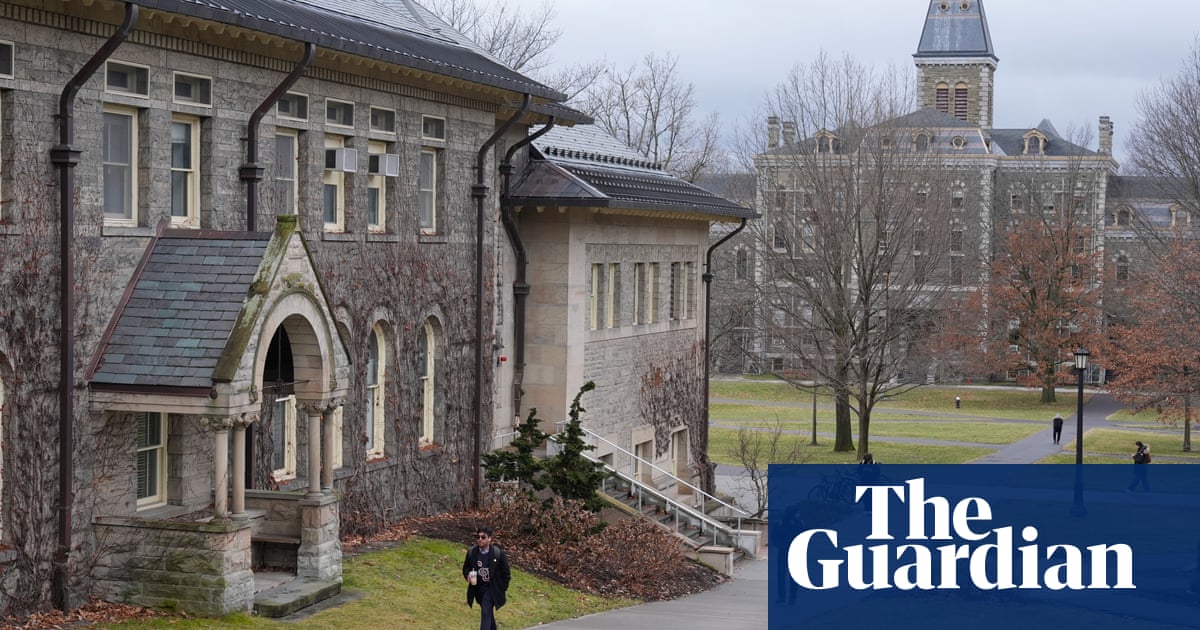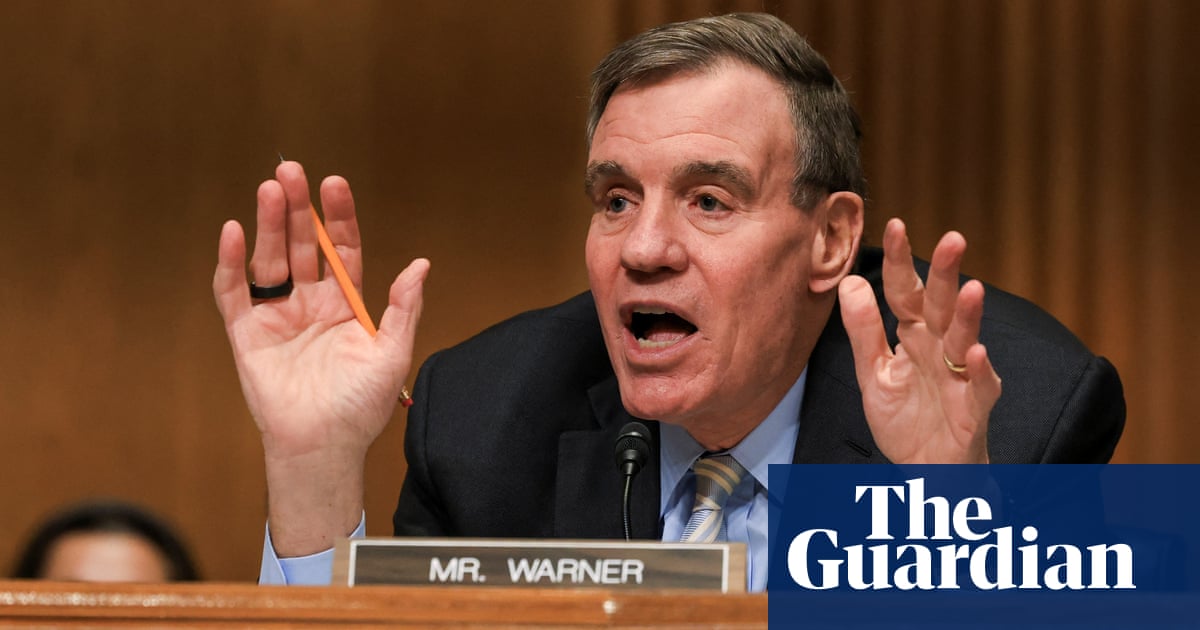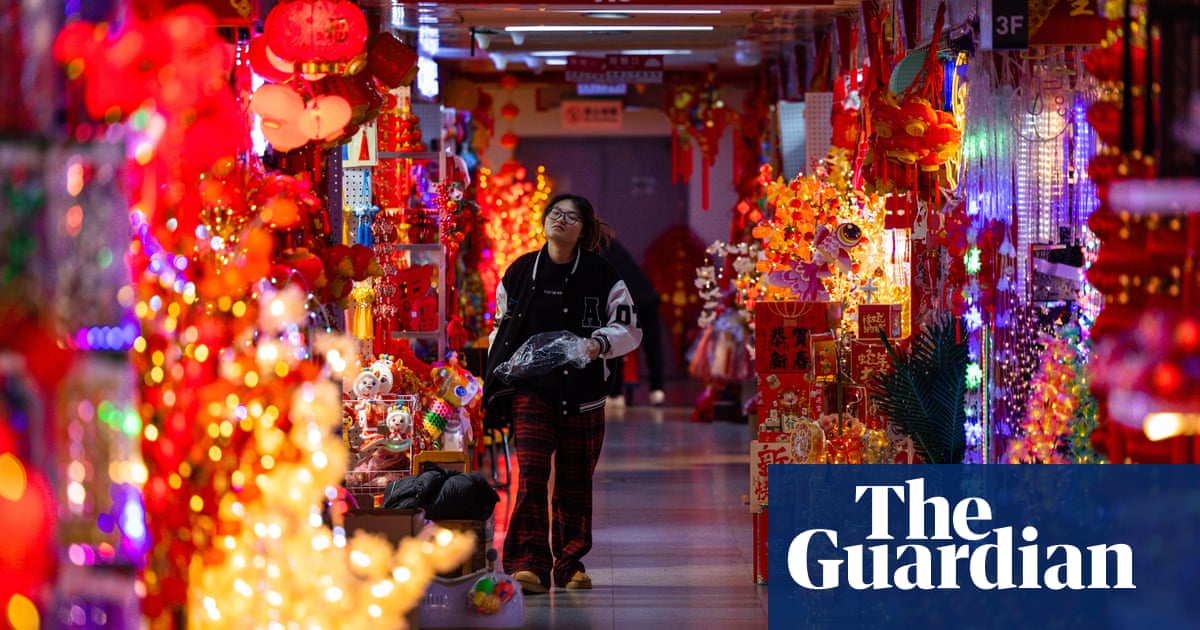
A broken statue of late Syrian president Hafez al-Assad lies outside the Ba’ath party offices in Damascus. Photograph: Louai Beshara/AFP/Getty Images
Show key events only
Please turn on JavaScript to use this feature
Live feed
Iran must live with 'new realities' of Syria, says head of Revolutionary Guards
The head of Iran’s Revolutionary Guards said the country has to live with the new “realities” of Syria after the toppling of Tehran-backed president Bashar al-Assad, state media reported on Thursday.
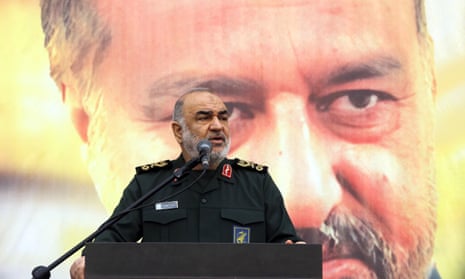
Regarding Syria, Iran “was really trying day and night to help in whatever way it could; we have to live with the realities of Syria; we look at them and act based on them,” Hossein Salami said, quoted by the official IRNA news agency.
He added:
Strategies must change according to the circumstances; we cannot solve numerous global and regional issues with stagnation and employing the same tactics
Iran has been a strong ally of the Assad family, whose decades-long rule of Syria ended on the weekend when a whirlwind rebel offensive took the capital Damascus.
Assad had long played a strategic role in Iran’s anti-Israel “axis of resistance”, particularly in facilitating the supply of weapons to Tehran’s ally Hezbollah in neighbouring Lebanon.
The axis of resistance includes Hezbollah as well as Hamas in Gaza, Huthi rebels in Yemen and some smaller Shia militia groups in Iraq.
Also on Thursday, the Islamic Revolutionary Guard Corps strongly condemned “the abuse of the current instability in Syria by the US and the Zionist regime”, which is Iran’s term for Israel.
“The Resistance Front will not be passive in confronting any plan or scheme that seeks to disrupt the resistance and weaken the power and authority of the countries in the region,” the Revolutionary Guards said in a statement.
Turkey has forces in northern Syria, while in the south the Israeli army has sent troops into a UN-patrolled buffer zone on the countries’ shared border, east of the Israeli-annexed Golan Heights.
The US also has troops based in Syria, where they have worked with Kurdish-led fighters battling the Islamic State group.
Ties between Tehran and Damascus peaked during the Syrian civil war that started in 2011, with the Revolutionary Guards sending what it called “military advisers” to help Assad. (Via Agence France-Presse)
Key events
Show key events only
Please turn on JavaScript to use this feature
The US secretary of state, Antony Blinken, has arrived in Jordan, according to AFP.
Blinken will also visit Turkey as he attempts to rally regional countries to help advance efforts to reach an elusive Gaza ceasefire and hostage deal, and ensure a smooth transition in Syria, after the ousting of longtime authoritarian ruler Bashar al-Assad. His national security adviser Jake Sullivan is also scheduled to visit Israel, Qatar and Egypt in the coming days.

Iran must live with 'new realities' of Syria, says head of Revolutionary Guards
The head of Iran’s Revolutionary Guards said the country has to live with the new “realities” of Syria after the toppling of Tehran-backed president Bashar al-Assad, state media reported on Thursday.

Regarding Syria, Iran “was really trying day and night to help in whatever way it could; we have to live with the realities of Syria; we look at them and act based on them,” Hossein Salami said, quoted by the official IRNA news agency.
He added:
Strategies must change according to the circumstances; we cannot solve numerous global and regional issues with stagnation and employing the same tactics
Iran has been a strong ally of the Assad family, whose decades-long rule of Syria ended on the weekend when a whirlwind rebel offensive took the capital Damascus.
Assad had long played a strategic role in Iran’s anti-Israel “axis of resistance”, particularly in facilitating the supply of weapons to Tehran’s ally Hezbollah in neighbouring Lebanon.
The axis of resistance includes Hezbollah as well as Hamas in Gaza, Huthi rebels in Yemen and some smaller Shia militia groups in Iraq.
Also on Thursday, the Islamic Revolutionary Guard Corps strongly condemned “the abuse of the current instability in Syria by the US and the Zionist regime”, which is Iran’s term for Israel.
“The Resistance Front will not be passive in confronting any plan or scheme that seeks to disrupt the resistance and weaken the power and authority of the countries in the region,” the Revolutionary Guards said in a statement.
Turkey has forces in northern Syria, while in the south the Israeli army has sent troops into a UN-patrolled buffer zone on the countries’ shared border, east of the Israeli-annexed Golan Heights.
The US also has troops based in Syria, where they have worked with Kurdish-led fighters battling the Islamic State group.
Ties between Tehran and Damascus peaked during the Syrian civil war that started in 2011, with the Revolutionary Guards sending what it called “military advisers” to help Assad. (Via Agence France-Presse)
Fifty-four journalists were killed worldwide while carrying out their work or because of their profession in 2024, a third of them by the Israeli army, according to an annual report by Reporters Without Borders (RSF) published on Thursday.
According to the press freedom NGO, Israeli armed forces were responsible for the deaths of 18 journalists this year – 16 in Gaza and two in Lebanon.

“Palestine is the most dangerous country for journalists, recording a higher death toll than any other country over the past five years,” RSF said in its annual report, which covers data up to 1 December.
The organisation has filed four complaints with the international criminal court (ICC) for “war crimes committed against journalists by the Israeli army”.
It said that in total “more than 145” journalists had been killed by the Israeli army in Gaza since the start of the war there in October 2023, with 35 of them working at the time of their deaths, RSF said.
The overthrow of Bashar al-Assad’s government by armed opposition groups offers “a momentous opportunity for Syria to break with decades of repression and turn the page on human rights”, according to Human Rights Watch.
“The Syrian people have endured more than a decade of brutal repression and conflict,” said Lama Fakih, Middle East and North Africa director at HRW. “This is a critical moment to reject the horror show of the past, rebuild trust, and lay the groundwork for a society where everyone is treated with dignity.”
But the group also points out that efforts to forge a new future for Syria must include “addressing decades of abuse by the former government and other warring parties during the country’s 13-year conflict, ensuring accountability, and protecting Syrians regardless of their ethnic or sectarian backgrounds or political affiliations”.
More here.
Dozens killed in Gaza airstrike
Palestinian medical officials say Israeli airstrikes have killed at least 28 people in the Gaza Strip, including seven children and a woman, hours after the UN General Assembly overwhelmingly approved a resolution demanding an immediate ceasefire in Gaza.
One of the strikes overnight and into Thursday flattened a house in the built-up Nuseirat refugee camp, according to the Al-Aqsa Martyrs Hospital in the nearby city of Deir al-Balah, where the casualties were taken.
Two other strikes killed 15 men who were part of local committees established to secure aid convoys. The committees were set up by displaced Palestinians in coordination with the Hamas-run interior ministry.
On Wednesday, the UN general assembly approved resolutions demanding an immediate ceasefire in Gaza and expressing support for the UN agency for Palestinian refugees that Israel has moved to ban. General assembly resolutions are not legally binding, although they reflect world opinion. (Via AP)

Israelis and Palestinians are signalling new efforts to forge a ceasefire deal – albeit a limited one – that would pause the fighting in Gaza and return to Israel some of the hostages still held in the Palestinian enclave.
In a phone call on Wednesday, Israel’s defence minister, Israel Katz, told his US counterpart, Lloyd Austin, there was now a chance for a new deal that would allow the return of all the hostages – including US citizens – Katz’s office said.
But a western diplomat in the region said that while a deal was taking shape, it was likely be limited in scope, involving the release of only a handful of hostages and a short pause in hostilities.
Such a truce and release would be only the second since the start of the war in October 2023. The guarded optimism emerges as US President Joe Biden’s national security adviser, Jake Sullivan, heads to Israel for talks with Prime Minister Benjamin Netanyahu on Thursday and then to Egypt and Qatar, co-mediators with the US on a deal.
Separately, President-elect Donald Trump has demanded that militants of the Palestinian Hamas group release the hostages held in Gaza before he takes over from Biden on 20 January. Otherwise, Trump has said, there will be “hell to pay”.
(Via Reuters)
Israeli hospital officials say a young boy died after being wounded in a shooting attack in the occupied West Bank that also wounded two adults.
An Israeli bus came under fire from a suspected Palestinian attacker late on Wednesday, the military said, and Israeli forces are searching for the shooter.
The shooting took place just outside Jerusalem in an area near major Israeli settlements.
Hadassah Hospital in Jerusalem said the boy was 12 years old, after initial reports said he was 10. A spokesperson for the hospital did not immediately respond to a request for clarification. The hospital said two other people, ages 24 and 55, were also wounded. (Via AP)

A new study of children living through the war in Gaza has found that 96% of them feel that their death is imminent and almost half want to die as a result of the trauma they have been through.
A needs assessment, carried out by a Gaza-based NGO sponsored by the War Child Alliance charity, also found that 92% of the children in the survey were “not accepting of reality”, 79% suffer from nightmares and 73% exhibit symptoms of aggression.

“This report lays bare that Gaza is one of the most horrifying places in the world to be a child,” Helen Pattinson, chief executive of War Child UK, said. “Alongside the levelling of hospitals, schools and homes, a trail of psychological destruction has caused wounds unseen but no less destructive on children who hold no responsibility for this war.”
Full report here:
Some of the regional, and international, consequences of recent events in Syria are explored in this piece, which looks at what it all means for more than 60 British Islamic State-linked prisoners – including Shamima Begum – who are currently held in Kurdish-controlled prisons and camps in north-east Syria.
Palestinian medical officials say an Israeli airstrike in central Gaza early on Thursday has killed at least 13 people, including seven children and a woman.
The strike flattened a house in the built-up Nuseirat refugee camp, according to the Al-Aqsa Martyrs Hospital in the nearby city of Deir al-Balah, where the casualties were taken.
An Associated Press reporter saw the bodies at the hospital’s morgue.

Opening summary
Hello, welcome to our live coverage of events in Syria and around the Middle East. It’s a little after 10am in Damascus and here are the major developments.
-
The US secretary of state, Antony Blinken, is headed for Jordan and Turkey on Thursday, where he is expected to rally regional countries to help advance efforts to reach an elusive Gaza ceasefire and hostage deal, and ensure a smooth transition in Syria, after the ousting of longtime authoritarian ruler Bashar al-Assad. His national security adviser Jake Sullivan is also scheduled to visit Israel, Qatar and Egypt in the coming days, US officials said.
-
Syria’s rebel leader Abu Mohammed al-Jolani has signalled he is seeking retribution, saying there will be no pardons for prison torturers. The rebel commander has vowed to dissolve Assad regime security forces, close its prisons and hunt down anyone involved in the torture or killing of detainees. He also said he would ask countries to hand over Assad regime officials who have fled the country.
-
At the Masnaa border crossing to Lebanon on Wednesday night, thousands of Syrians were trying to leave the country despite assurances from Jolani’s group, Hayat Tahrir al-Sham (HTS) that civil rights and sectarian differences will be respected. Rebel fighters appeared to be searching for members of the regime army and security services trying to get to Lebanon with their families. Syrian refugees residing in countries such as Turkey, have also been lining up at the border to return home.
-
Mohammed al-Bashir, who has been appointed by the rebels as Syria’s interim leader pledged that the rights or all people and sects in Syria would be guaranteed. The comments come as a mausoleum in Qardaha near Latakia that housed the remains of ousted president, Bashar al-Assad’s father, Hafez, who seized control of Syria in 1970, was burned by armed Islamist rebels.
-
Israel, which has been fighting both the Palestinian group Hamas in Gaza and the Lebanese militia Hezbollah for over a year, has deployed ground troops into and beyond a demilitarised buffer zone in the disputed Golan Heights, its first foray into Syrian-controlled territory for 50 years.
-
Iran’s supreme leader, Ayatollah Ali Khamenei, has claimed the US and Israel acted as the command centre that engineered the downfall of Syria’s former president, Bashar al-Assad, and the ousting of Iran from the country.
-
The UN general assembly on Wednesday overwhelmingly adopted a resolution calling for an immediate and unconditional ceasefire in Gaza, a symbolic gesture rejected by the United States and Israel. The resolution was adopted by a vote of 158-9, with 13 abstentions and urges “an immediate, unconditional and permanent ceasefire,” and “the immediate and unconditional release of all hostages”.
-
The UN would consider taking the Syrian rebel group that toppled the regime of Bashar al-Assad off its designated terrorist list if it passes the key test of forming a truly inclusive transitional government, according to a senior official at the world body.
-
The tomb of ousted Syrian president Bashar al-Assad’s father Hafez was torched in his home town of Qardaha, accoding to AFP footage taken on Wednesday. AFP said it showed rebel fighters in fatigues and young men watching it burn. The Syrian Observatory for Human Rights war monitor told AFP the rebels had set fire to the mausoleum, located in the Latakia heartland of Assad’s Alawite community.
Explore more on these topics

No pardons for prison torturers, says Syrian rebel leader

Shamima Begum and 65 other IS-linked Britons detained in Syria face uncertain future
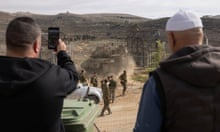
Fear and uncertainty in Golan Heights as Israeli troops drive deeper into Syria

Delivering post, calculating inflation: Syrians get back to work after ousting of Assad

Islamist groups from across the world congratulate HTS on victory in Syria

Politics Weekly UK
What next for Britain’s Syrian refugees? – Politics Weekly UK
France urges Israel to leave Syria buffer zone as tomb of Assad’s father set on fire – Middle East crisis as it happened

Assad downfall was planned by US and Israel, claims Iran’s supreme leader

.png) 3 months ago
38
3 months ago
38












